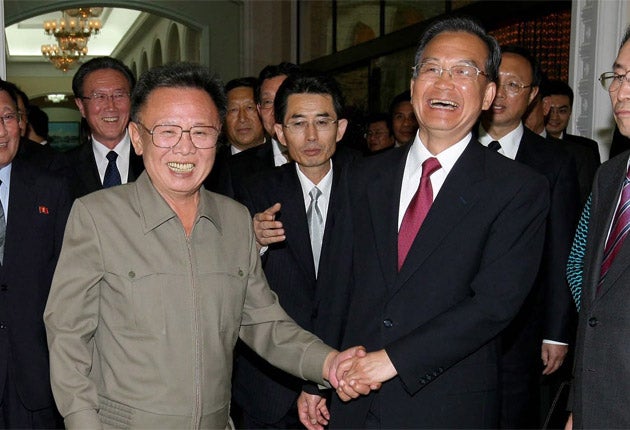Kim all smiles as he offers US a nuclear olive branch
North Korean leader uses visit from Chinese PM to suggest talks on weapons programme could resume

Six months after declaring the six-party talks on the future of its nuclear weapons programme "dead", North Korea relented somewhat yesterday, suggesting they could be revived on condition that progress was made first on relations with the United States.
Although it was met with some scepticism by specialists in the West, any softening of Pyongyang's stance could help revive the negotiations which fell apart this spring when it conducted a large underground nuclear explosion and test-fired missiles over the ocean.
The offer came during a long-awaited visit to Pyongyang by China's Prime Minister, Wen Jiabao. It had been widely expected that China would use the mission to persuade the North Korean leader, Kim Jong-Il, to reach out after months of escalating tensions in the region.
The state news agency in North Korea, formally known as the Democratic People's Republic of Korea, quoted Kim as telling his Chinese guest of his "readiness to hold multilateral talks, depending on the outcome of the DPRK-US talks. The hostile relations between North Korea and the United States should be converted into peaceful ties through the bilateral talks without fail".
The move was publicly welcomed last night by both China and Russia. For its part, the United States has repeatedly said that while it is open to renewed bilateral dialogue with Pyongyang it will not allow such talks to replace the wider forum of the six-nation talks, which also involve South Korea, Japan, China and Russia. Seoul in particular has insisted that it must not be sidelined in the course of any deal-making with Pyongyang. "We, of course, encourage any kind of dialogue that would help us lead to... the complete and verifiable denuclearisation of the Korean peninsula," said State Department spokesman Ian Kelly. Washington will, however, be wary of North Korea trying to over-emphasise the bilateral discussions and extract concessions from the US before rejoining the wider negotiations. "This is a test for the Obama administration's policy on North Korea," noted Ryoo Kihl-jae, a professor of North Korean studies in Seoul.
Stephen Bosworth, President Barack Obama's special envoy to North Korea, said last month that the US was "willing to engage with North Korea on a bilateral basis," but added: "We do not consider in any way that bilateral engagement is a substitute for multilateral engagement, and this is not a substitute for us for the re-ignition of the six-party talks." At the heart of the six-party process is a package whereby North Korea would dismantle its entire nuclear weapons programme, mostly based at its large Yongbyon complex which lies 62 miles northwest of Pyongyang, in return for an end to its diplomatic isolation, a peace treaty formally ending the conflict on the Korean peninsula, security guarantees and an extensive programme of economic assistance.
The deal has been hard to finalise, however, partly because of disputes over which elements would be implemented first. In New York last month, the President of South Korea, Lee Myung-bak, startled the other negotiating partners by proposing a so-called 'grand bargain' under which there would be no series of steps to enact its provisions. Instead, they would all be implemented at once.
There is so far no telling whether Pyongyang is putting on a new smile because of Chinese pressure or if it is serious about renewing the negotiation process. "The real stumbling block is whether North Korea will show willingness to give up its nuclear weapons," commented Kim Tae-woo, an expert at the Korea Institute for Defence Analyses in Seoul. "If not, this does not mean any real progress."
"I am sceptical," commented Mark Fitzpatrick of the International Institute for Strategic Studies in London. "I do not think that North Korea wants to give up its nuclear weapons. The North might even want the US to accept it as a nuclear state."
The test explosion and missile launches this spring prompted the UN Security Council to tighten trade and financial restrictions on the regime. It included a call for all nations to stop and search ships suspected of carrying goods that could help North Korea build or proliferate weapons.
The Obama administration finds itself tackling two potential nuclear crises at once. North Korea is putting its head over the parapet just as Washington and other world powers are reaching a crucial stage in negotiations with Iran over its nuclear ambitions. Iran is likely to face stringent new sanctions too if it fails convincingly to support its claim that it is seeking to develop civil nuclear capabilities only.
Subscribe to Independent Premium to bookmark this article
Want to bookmark your favourite articles and stories to read or reference later? Start your Independent Premium subscription today.

Join our commenting forum
Join thought-provoking conversations, follow other Independent readers and see their replies